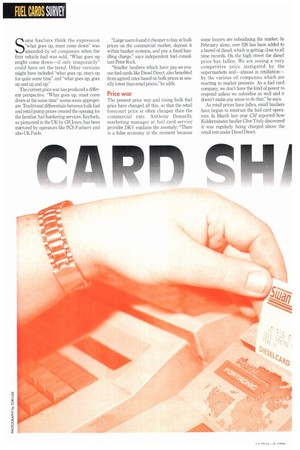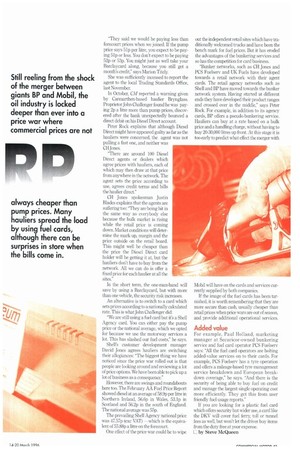S ome hauliers think the expression "what goes up, must come
Page 54

Page 55

If you've noticed an error in this article please click here to report it so we can fix it.
down" was amended by oil companies when the first vehicle fuel was sold. "What goes up might come down—if only temporarily" could have set the trend. Other versions might have included "what goes up, stays up for quite some time" and "what goes up, goes up and up and up."
The current price war has produced a different perspective. "What goes up, must come down at the same time" seems more appropriate. Traditional differentials between bulk fuel and retail pump prices created the opening for the familiar fuel bunkering services Keyfuels, as pioneered in the UK by CH Jones, has been mirrored by operators like PCS Fuelserv and also UK Fuels "Large users found it cheaper to buy at bulk prices on the commercial market, deposit it within bunker systems, and pay a fixed handling charge," says independent fuel consultant Peter Rock.
"Smaller hauliers which have pay-as-youuse fuel cards like Diesel Direct, also benefited from agreed rates based on bulk prices at usually lower than retail prices," he adds.
Price war
The present price war and rising bulk fuel price have changed all this, so that the retail forecourt price is often cheaper than the commercial rate. Anthony Donnelly marketing manager at fuel card service provider DKV explains the anomaly: "There is a false economy at the moment because some buyers are subsidising the market. In February alone, over $26 has been added to a barrel of diesel, which is getting close to all time records. On the high street the diesel price has fallen. We are seeing a very competitive price instigated by the supermarkets and—almost in retaliation— by the various oil companies which are reacting to market pressure. As a fuel card company, we don't have the kind of power to respond unless we subsidise as well and it doesn't make any sense to do that," he says
As retail prices have fallen, small hauliers have begun to mistrust the fuel card operators. In March last year CM reported how Kidderminster haulier Clive Titely discovered it was regularly being charged above the retail rate under Diesel Direct.
"They said we would be paying less than forecourt prices when we joined. lithe pump price says 51p per litre, you expect to be paying 51p or less. You don't expect to be paying 52p or 53p. You might just as well take your Barclaycard along, because you still get a month's credit," says Marion Titely.
She was sufficiently incensed to report the agent to the local Trading Standards Office, last November.
In October, CM reported a warning given by Carmarthen-based haulier Brynglass. Proprietor John Challenger found he was paying 2p a litre more than pump prices, discovered after the bank unexpectedly bounced a direct debit on his Diesel Direct account.
Peter Rock explains that although Diesel Direct might have appeared guilty as far as the hauliers were concerned, the agent was not pulling a fast one, and neither was CH Jones.
"There are around 100 Diesel Direct agents or dealers which agree prices with hauliers, each of which may then draw at that price from anywhere in the network The agent sets the price according to use, agrees credit terms and bills the haulier direct."
CH Jones spokesman Justin Blades explains that the agents are suffering too: "They are being hit in the same way as everybody else because the bulk market is rising while the retail price is coming down. Market conditions will determine the mark-up, margin and the price outside on the retail board. This might well be cheaper than the price the Diesel Direct card holder will be getting it at, but the hauliers don't have to buy from the network. All we can do is offer a fixed price for each haulier at all the sites."
In the short term, the one-man-band will save by using a Barclaycard, but with more than one vehicle, the security risk increases.
An alternative is to switch to a card which sets prices according to a nationally calculated rate. This is what John Challenger did: "We are still using a fuel card but it's a Shell Agency card. You can either pay the pump price or the national average, which we opted for because we use the motorway services a lot. This has slashed our fuel costs," he says.
Shell's customer development manager David Jones agrees hauliers are switching their allegiances: "The biggest thing we have noticed since the price war rolled out is that people are looking around and reviewing a lot of price options. We have been able to pick up a lot of business as a consequence."
However, there are swings and roundabouts here too. The February AA Fuel Price Report showed diesel at an average of 58.9p per litre in Northern Ireland, 5(16p in Wales, 531p in Scotland and 56.2p in the south of England. The national average was 55p.
The prevailing Shell Agency national price was 47.57p (exc VAT) —which is the equivalent of 55.88p a litre on the forecourt.
One effect of the price war could be to wipe out the independent retail sites which have traditionally welcomed trucks and have been the bench mark for fuel prices. But it has eroded the advantages of the bunkering services and so has the competition for card business.
"Bunker networks, such as CH Jones and PCS Fuelserv and UK Fuels have developed towards a retail network with their agent cards. The retail agency networks such as Shell and BP have moved towards the bunker network system. Having started at different ends they have developed their product ranges and crossed over in the middle," says Peter Rock. For example, in addition to its agency cards, BP offers a pseudo-bunkering service. Hauliers can buy at a rate based on a bulk price and a handling charge, without having to buy 20-30,000 litres up front. At this stage it is too early to predict what effect the merger with Mobil will have on the cards and services currently supplied by both companies.
If the image of the fuel cards has been tarnished, it is worth remembering that they are more secure than cash, usually cheaper than retail prices when price wars are out of season, and provide additional operational services.
Added value
For example, Paul Holland, marketing manager at Securicor-owned bunkering service and fuel card operator PCS Fuelserv says: "All the fuel card operators are bolting added-value services on to their cards. For example, PCS Fuelserv has a tyre operation and offers a mileage-based tyre management service breakdown and European breakdown coverage," he says. "And there is the security of being able to buy fuel on credit and manage the largest single operating cost more efficiently. They get this from user friendly fuel usage reports."
If you are looking for a plastic fuel card which offers security but wider use, a card like the DKV will cover fuel ferry, toll or tunnel fees as well, but won't let the driver buy items from the duty free at your expense.
L by Steve McQueen
































































































































